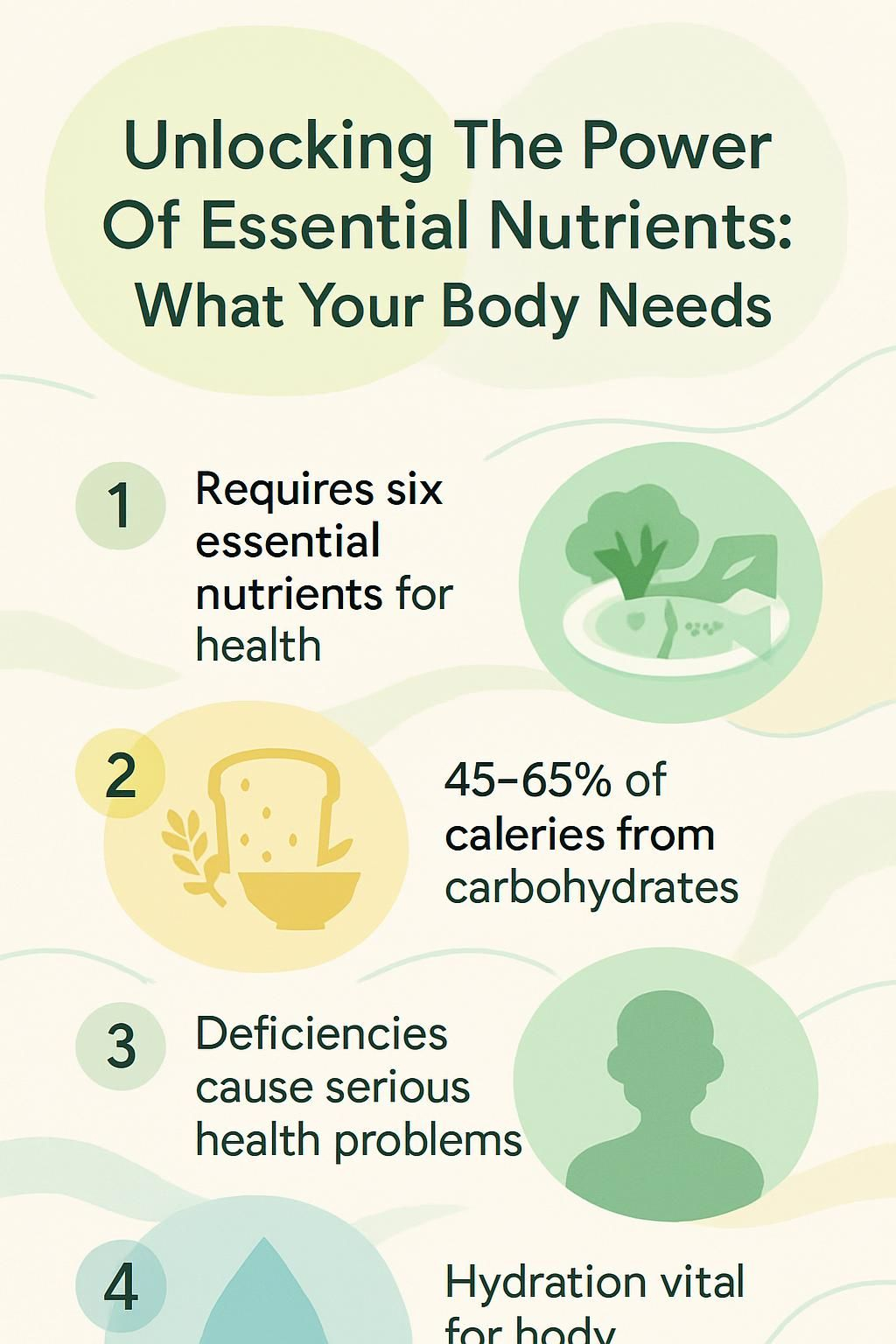Unlocking The Power Of Essential Nutrients: What Your Body Needs
Our Nutrition Assistant AI Suite will transform your body. You will lose fat, get toned, and build muscle. Gain confidence and optimal health.
Choosing what to eat can feel confusing. Essential nutrients, the chemical substances your body needs, power key functions that you cannot maintain through body stores alone. Understanding the 6 essential nutrients helps you build meals that support energy, mood, and long-term health.
This guide explains each essential nutrient in clear terms, shows why they matter, and offers simple ways to meet your needs with a balanced diet. Use these ideas to support your health every day.
Key Takeaways
- Your body needs six essential nutrients: carbohydrates, proteins, fats, vitamins, minerals, and water. These support energy, growth, repair, and disease prevention, as noted by the World Health Organization.
- The Dietary Guidelines for Americans recommend 45 to 65 percent of daily calories from carbohydrates, 10 to 30 percent from protein, and 20 to 35 percent from fat.
- Low intakes of iron, calcium, vitamin D, or magnesium can lead to anemia, weak bones, poor muscle function, or lower immunity. Children and older adults are at higher risk.
- Chronic illnesses, including cancer, diabetes, or malabsorption conditions, can change nutrient needs. Personalized guidance from a registered dietitian is helpful.
- Water makes up about 60 percent of body mass. Daily hydration supports nutrient transport, waste removal, and temperature control.

What Are Essential Nutrients?

Essential nutrients are substances your body must get from food because it cannot make enough of them. They support daily functions like breathing, moving, thinking, and healing.
What are essential nutrients?
Your body depends on six essential nutrient groups: carbohydrates, proteins, fats, vitamins, minerals, and water. Food supplies these because your body cannot produce them in needed amounts. Health groups like the World Health Organization and the Food and Nutrition Board stress their importance for human nutrition.
Protein builds and repairs tissues like muscle and skin. Carbohydrates provide fast fuel. Vitamins and minerals, such as vitamin C, vitamin E, calcium, iron, and magnesium, support immunity, blood flow, and strong bones.
Water moves nutrients, aids digestion, and helps control body temperature. A balanced diet with fruits and vegetables, whole grains, lean or red meat in moderate amounts, and plant-based foods gives your body what it needs to grow and stay healthy.
You cannot store up health; you must supply it daily.
Why are essential nutrients important for your body?
Essential nutrients drive energy production, tissue growth, immune defense, and hormone balance. Proper nutrition also speeds recovery after illness or surgery.
Low iron intake can cause anemia, a drop in healthy red blood cells that often leads to fatigue. Calcium and vitamin D support strong bones. Protein repairs muscles after workouts. Water keeps you hydrated and carries vitamins and minerals to cells.
Deficiencies in any major nutrient can lead to malnutrition or weaker immunity. Following evidence-based dietary guidelines protects against disease and helps maintain clear thinking as you age.
The Six Essential Nutrients Your Body Needs
Each nutrient group plays a distinct role. Together they help you move, think, and recover through every season of life.
Protein: How does it build tissues and muscles?
Protein is a building block for bones, skin, hair, and muscle. During growth or after activity, your cells use amino acids from protein to repair damage and form new tissue.
Essential amino acids must come from food. Good sources include meat, dairy, eggs, legumes, and tofu. In the United States, many people do well with 10 to 30 percent of daily calories from protein, based on age and activity.
Clinical nutrition expert Dr. Maria Torres says, “Protein helps your body recover faster and build muscle mass.” Too little protein can cause slow wound healing or loss of muscle.
Proteins do more than just build muscles; they support nearly every function in your body.
Aim for a mix of animal and plant proteins. Both support strong bones and steady tissue repair across organs like skin and hair.
Carbohydrates: Why are they the main energy source?
Carbohydrates are your body’s primary source of fuel. Sugars, starches, and fiber from plants break down into glucose, which the brain and nervous system prefer for quick energy.
Guidelines suggest 45 to 65 percent of daily calories from carbohydrates. Simple sugars like glucose and fructose give quick energy. Complex carbs like starch digest slowly and offer steadier fuel. Balanced carbohydrate intake supports stable blood sugar and helps prevent crashes.
As a student athlete, I found whole grain meals before games improved my focus and endurance more than low-carb options. Carbohydrates support both mental and physical performance.
Fats: How do they support energy and vitamin absorption?
Fats supply long-lasting energy and help your body use key vitamins. One gram of fat provides about 9 calories, more than twice the energy of protein or carbohydrate.
Vitamins A, D, E, and K are fat soluble. You absorb them better when meals include healthy fats. Experts recommend 20 to 35 percent of daily calories from fat, with most from unsaturated sources.
Too little fat can lead to dry skin or constipation. Including small amounts of healthy oils supports cell membranes and smoother nutrient transport.
Vitamins: What roles do they play in bodily functions and immunity?
Your cells need 13 vitamins for normal function and growth. Fat-soluble vitamins A, D, E, and K support vision, bones, blood clotting, and immune defense. Water-soluble vitamins, including vitamin C and the B complex, assist energy production, heart health, skin, and nerves.
Vitamers are different forms of the same vitamin. For example, thiamine, a form of vitamin B1, helps turn carbohydrates into usable energy. Tocopherol, a form of vitamin E, acts as an antioxidant that protects tissues.
Countries such as the United States and Canada publish recommended dietary allowances to guide safe intake. Ongoing research continues to clarify how vitamins protect cells from damage and infection.
Minerals: How do they maintain strong bones and enzyme functions?
Minerals work with vitamins to keep systems running. Calcium teams with phosphorus to harden bones and teeth, which store most of your calcium. Magnesium supports bone formation and helps vitamin D with calcium absorption.
Minerals also drive enzymes, the proteins that run your metabolism. Iron helps hemoglobin carry oxygen in the blood. Zinc supports tissue repair and immune function. Others, including copper, selenium, chromium, manganese, potassium, and chloride, help balance fluids and support nerve messages.
After painful leg cramps during half-marathon training, my doctor found I was low in magnesium. Adding nuts, yogurt, lean beef, and leafy greens improved my energy and recovery.
Water: Why is it vital for hydration and nutrient transport?
Water makes up about 60 percent of your body weight. Every organ relies on it. Water transports vitamins and minerals to cells, carries oxygen, and removes waste through urine and sweat.
Fruits and vegetables add fluid to your day, but plain water should do most of the work. Even mild dehydration can slow thinking and limit how well tissues function. Dietitians encourage regular sips to keep cell processes running smoothly.
Macronutrients vs. Micronutrients
Macronutrients provide energy and structure. Micronutrients, such as vitamins and minerals, are needed in small amounts for cell function and protection.
What are macronutrients and why do we need them?
Macronutrients are nutrients you need in larger amounts: carbohydrates, protein, and fat. They supply calories for movement and growth and support tissues and cells.
Each gram of carbohydrate or protein provides about 4 calories. Each gram of fat provides about 9 calories. Protein builds muscle and makes enzymes like protease, which supports digestion. Carbohydrates fuel your brain and body. Fats, including essential fatty acids like omega-3s, help absorb vitamins and protect organs.
Eating a balanced mix of macronutrients keeps organs, tissues, and cells working well. Micronutrients complete the picture.
What are micronutrients and why are they important?
Micronutrients include vitamins and minerals that you need in small amounts. They support immunity, nerve function, metabolism, and cell growth.
Examples: calcium strengthens bones, vitamin C supports immune health, and iron helps carry oxygen in blood. Public health data show micronutrient deficiencies still affect billions of people worldwide.
Fruits, vegetables, whole grains, dairy, lean meats, nuts, and fortified foods help you meet daily needs. I felt sluggish when I skipped fruit at breakfast. Adding berries and greens brought my energy back.
Micronutrients may be small in quantity, yet their effects on cells are big. They keep tissues repairing and organs functioning day after day.
The Role of Protein in the Body
Your body uses protein to repair cells and make new tissue. Choosing the best source of protein supports muscle growth and healthy organs.
What are the best sources of healthy protein?
Eggs, chicken, turkey, pork, beef, and lamb provide complete proteins with all nine essential amino acids. Fish like salmon and tuna add omega-3 fats as well.
Dairy foods, such as milk, yogurt, and cheese, supply protein and calcium. Beans, lentils, and legumes offer plant protein and fiber. One cup of cooked lentils has about 18 grams of protein.
Nuts and seeds add protein and healthy fats. Tofu and tempeh boost intake without adding more meat. A mix of animal and plant sources helps you cover amino acid needs and supports tissue repair.
Studies show that people who eat a variety of protein sources tend to maintain better muscle mass and overall health markers.
Why are amino acids important for your body?
Amino acids are the building blocks of protein. They repair tissues, form enzymes, and help make hormones. Some, like isoleucine, leucine, lysine, methionine, phenylalanine, and cysteine, are essential. You must get them from food.
These amino acids connect through peptide bonds to form proteins that your cells use every moment. People who train hard or recover from illness need enough protein to prevent muscle loss, called cachexia in clinical settings.
Animal proteins contain all essential amino acids. You can also combine plant foods, such as beans with rice, to build a complete amino acid profile. I noticed faster recovery once I planned meals around complete proteins after workouts.
Getting all 20 amino acids, especially the nine essential ones, supports growth, immunity, and cell function.
Carbohydrates and Their Energy-Providing Role
Carbohydrates act as your main fuel. Smart choices deliver energy, fiber, and important vitamins and minerals.
What is the difference between simple and complex carbohydrates?
Simple carbohydrates digest quickly. Sodas and table sugar cause fast blood sugar spikes, which can challenge people with diabetes.
Complex carbohydrates break down slowly. Whole grains, beans, and vegetables help steady blood sugar and keep you full longer.
Both types provide energy, but complex carbs support steadier levels. Oatmeal at breakfast keeps me energized until lunch. A sugary snack often leaves me tired an hour later.
Choosing more complex carbohydrates can improve blood sugar control and provide more nutrients your cells need.
Which carbohydrate choices are healthiest?
Pick carbohydrates from fruits, vegetables, whole grains, beans, and legumes. These foods supply fiber, vitamins, minerals, and steady energy.
The Dietary Guidelines for Americans recommend making at least half of your grains whole. Options like steel-cut oats or brown rice digest slowly and help stabilize blood sugar.
Limit refined grains, such as white bread or pastries, because they lack nutrients found in the whole grain. Avoid candy and sugar-sweetened drinks. These contain added sugar but little nutrition.
A 2019 peer-reviewed analysis linked higher intakes of unprocessed carbohydrates with a lower risk of chronic illness^1^. I swapped sugary snacks for apple slices with peanut butter or roasted chickpeas and noticed steadier energy.
Complex carbs also feed healthy gut bacteria, which produce short-chain fatty acids that support digestion. Choosing these foods offers lasting fuel and supports vital functions across the body.
…
^1^ Source: US Department of Health & Human Services (Dietary Guidelines Advisory Committee), 2020
Understanding Fats and Their Benefits
Fats influence heart health, cell structure, and how your body absorbs fat-soluble vitamins like tocopherols and tocotrienols.
What is the difference between unsaturated and saturated fats?
Unsaturated fats, found in nuts, seeds, fatty fish like salmon, and plant oils, provide essential fatty acids such as omega-3 and omega-6. Research shows they can lower LDL, the harmful cholesterol, and support heart health.
Saturated fats are common in butter, cheese, red meat, and many baked goods. High intake can raise LDL and increase heart risk. Swapping to olive oil or other unsaturated fats for dressings and cooking is a simple place to start.
Why are omega-3 fatty acids beneficial?
Omega-3 fatty acids support heart and brain function. They help lower triglycerides, calm inflammation, and may reduce the risk of heart disease and stroke.
Good sources include salmon, mackerel, sardines, and flaxseed oil. The American Heart Association suggests two servings of fatty fish per week for heart health.
Your body cannot make omega-3s, so food or supplements must supply them. Cell membranes use these fats to stay flexible and support signals between cells.
Regular intake has been linked to better memory and learning. I added grilled salmon weekly and noticed sharper focus at work over time.
The Vital Role of Vitamins
Vitamins affect nearly every system. Aim to meet needs with nutritious foods. Use supplements only when necessary.
What are fat-soluble and water-soluble vitamins?
Fat-soluble vitamins include A, D, E, and K. Your body stores them in fat tissue and the liver. They support vision, bones, blood clotting, and immune health. Large or long-term high doses can build up and become unsafe.
Water-soluble vitamins include vitamin C and B vitamins. Your body does not store them well, so daily intake matters. Extra amounts leave through urine. These vitamins support growth, heart and nerve function, and skin health.
Fruits, vegetables, whole grains, and fortified foods are reliable sources. Both groups play unique roles among the 6 essential nutrients you need each day.
Which key vitamins are essential and what do they do?
Vitamin A supports immunity and vision. B vitamins, from B1 to B12, help turn food into energy and support your brain and nerves. Vitamin C repairs tissues and supports immune defenses.
Vitamin D works with calcium to build strong bones and may support clear thinking. Vitamin E protects red and white blood cells. Vitamin K helps blood clot, so minor cuts do not bleed for too long.
I take vitamin D during winter since I get little sun. My doctor recommended it after reviewing research on common low levels in older adults. A balanced diet with fruits, vegetables, lean proteins like eggs or beans, and minerals can keep vitamin levels steady without exceeding safe limits.
Minerals: The Foundation of Strong Bones and More
Minerals like calcium and magnesium control many processes, from bone strength to nerve signals. Evidence from peer-reviewed research guides how much to aim for.
What are major minerals and their functions?
Major minerals are needed in larger amounts. Calcium builds bones and teeth, controls muscle contractions, supports the heart, and helps the nervous system. Phosphorus teams with calcium for bones and helps produce energy and repair cells.
Magnesium assists protein formation, nerve function, and energy production from food. Sodium supports nerve signals and muscle movement and helps absorb nutrients across cell membranes. Potassium balances fluids inside cells, supports steady heartbeats, and assists muscles.
Meeting these needs through dairy products, leafy greens, nuts, fish, and whole grains supports bone health. Research shows a balanced intake of calcium and vitamin D can lower osteoporosis risk later in life.
What are trace minerals and why do you need them?
Trace minerals are needed in small amounts, but their impact is large. Iron supports hemoglobin, which carries oxygen in blood. Zinc strengthens immunity and supports vision. Selenium supports thyroid and reproductive health. Copper supports brain development and immune function.
Iodine helps your thyroid make hormones. Chromium aids carbohydrate and fat metabolism. Manganese protects cells and helps produce energy. Fluoride strengthens bones and helps prevent tooth decay.
Together, these minerals help maintain energy, protect tissues, and support normal growth.
Water: The Most Essential Nutrient
Water keeps your body in balance. It makes every system, from digestion to brain function, work more smoothly.
How can you stay properly hydrated?
Start with plain water and sip throughout the day. Unsweetened tea or diluted juice can contribute. Water-rich foods like watermelon, cucumbers, and oranges also help.
Carry a refillable bottle to make sipping easy. Aim for pale yellow or clear urine as a quick hydration check. On summer hikes, I learned that drinking often worked better than waiting for thirst, which can come late.
Good hydration improves nutrient transport. It also helps your body use supplements more effectively if you take them.
What roles does water play in temperature regulation and detoxification?
Water helps control body temperature through sweat. As sweat evaporates, your body cools. Without enough water, you can overheat during exercise or hot weather. Even mild dehydration can raise core temperature.
Your kidneys use water to remove toxins and waste through urine. Low fluid intake can slow this process and lead to constipation, headaches, or fatigue.
Hydration also cushions joints and protects nerves. Meeting daily fluid needs supports every cell that relies on nutrient transport.
Next you will learn practical tips for proper hydration in daily life.
How Nutrition Needs Change Over Time
Nutrient needs shift as you age. Changes in appetite, digestion, and activity can affect how much of each nutrient your body requires.
What are the nutritional needs during childhood?
Children need balanced meals from all five food groups: dairy, fruits, grains, protein foods, and vegetables. These provide macronutrients like protein, carbohydrates, and fats, plus essential micronutrients like vitamins and minerals.
During the first six months, breast milk or infant formula meets nutrition needs. Solid foods usually begin around six months, with guidance from a pediatrician.
A varied diet supports bone and muscle growth and brain development. For my younger sibling, I planned meals with colorful produce, whole grains, eggs or beans, and calcium-rich dairy. This approach kept nutrition steady without supplements unless the doctor suggested them.
How do nutritional needs change for aging adults?
Appetite often drops with age. Medications and health conditions can dull taste and reduce interest in food. Older adults should pay close attention to vitamin D and calcium for bone strength. Absorption may decline with age.
Many experts recommend that adults over 70 aim for 1,200 milligrams of calcium and 800 IU of vitamin D daily. Focus on nutrient-dense foods rather than calories alone. My grandmother had a low appetite, so we added small servings of yogurt and leafy greens to meet her needs without large portions.
Hydration remains important, since thirst often fades with age. Adjusting intake over time supports steady health.
Medical Conditions That Impact Nutritional Needs
Chronic conditions can change how your body uses nutrients. Personal plans can help you meet goals safely.
How do chronic illnesses affect nutrient requirements?
Cancer-related weight loss can raise energy needs beyond what you eat. Malabsorption syndromes limit the gut’s ability to absorb vitamins and minerals. Depression can reduce food intake and interest in cooking, raising the risk of protein and vitamin shortages.
Dysphagia, or trouble swallowing, makes it harder to meet daily needs. Many clients I supported improved their intake after starting a simple meal plan matched to their condition and schedule.
Each illness affects nutrient needs in different ways. Careful planning helps close the gaps.
Why should you consult a nutrition expert?
Conditions like diabetes or heart disease change how your body absorbs or uses nutrients. A registered dietitian can tailor a plan to your medical needs and lifestyle, using evidence-based advice.
The Academy of Nutrition and Dietetics offers a directory to find credentialed experts. An RD helped me adjust protein sources after I was diagnosed with high cholesterol. That guidance made my meals both satisfying and heart friendly.
Professional support helps you avoid common myths and keep changes safe and effective.
Tips for Maintaining a Balanced Diet
Balanced eating supplies each essential nutrient your body needs. Small, steady steps work best.
How can you include a variety of nutrient-dense foods?
Include all five food groups daily. Choose whole grains like oats and brown rice. Eat a rainbow of fruits and vegetables to cover different vitamins and minerals.
Pick lean proteins, such as chicken, fish, beans, or tofu. Add healthy fats from avocados, nuts, or olive oil to help your body absorb fat-soluble vitamins.
At home, we plan the week to cover all groups. Breakfast might be whole-grain toast with peanut butter and a banana. Lunch could be a colorful salad with grilled chicken. Dinner might be salmon with roasted vegetables and quinoa. This plan helps us cover the six essential nutrients consistently.
USDA data show that greater variety is linked with better health outcomes and a lower risk of chronic disease.
Why is portion control important?
Portion control makes calorie and nutrient balance easier. Proper amounts help your body absorb protein, fats, carbohydrates, vitamins, and minerals in the right mix.
The USDA reports that portion awareness helps reduce risks related to obesity, heart disease, and type 2 diabetes. Try measuring servings or using smaller plates. Large portions of starch can crowd out other food groups and key nutrients.
Balanced portions support a balanced diet and steady energy.
Supplements: Are They Necessary?
Supplements may help in special cases. Food should still be the base of your plan.
When should you consider taking supplements?
Consider supplements if you have a diagnosed deficiency or cannot meet needs through food. Many people benefit from vitamin D during low-sun months. Pregnant women may need folic acid or iron.
Strict diets due to allergies, vegan choices, or illness can create gaps. Adults over 50 often need vitamin B12 because absorption falls with age.
Talk with a healthcare provider before starting any supplement. Too much of some nutrients can harm health.
What are the risks of over-supplementation?
Over-supplementation can cause serious problems. Fat-soluble vitamins A, D, E, and K can build up in the liver and fatty tissues. High doses may damage organs. Too much vitamin A, for example, can harm the liver and weaken bones.
Minerals carry risks too. Excess iron can collect in organs and cause poisoning. High calcium from supplements may raise the risk of kidney stones. Even mild overdoses can cause nausea or headaches in sensitive people.
I once took large doses of vitamin C for a cold and ended up with stomach pain. Sticking to safe ranges set by groups like the National Institutes of Health is wiser than chasing quick fixes.
Common Myths About Nutrition
Nutrition myths spread fast. Clear facts help you make choices that work in daily life.
What are common misconceptions about fats, carbs, and calories?
Myth: all fats are bad. Truth: unsaturated fats from avocados, nuts, and olive oil support heart health and vitamin absorption. Myth: cut all carbs. Truth: complex carbohydrates, such as whole grains, fuel your brain and muscles.
Some think fewer calories always mean better health. Quality matters as much as quantity. A 2021 Nutrients study reported that nutrient-dense choices like fruits, vegetables, lean proteins, and healthy fats support better health than low-calorie processed foods.
I once stopped eating rice to lose weight fast. Instead of more energy, I felt sluggish because I lacked steady fuel and essential nutrients. Balance beat restriction.
Conclusion
Meeting your body’s nutrient needs builds a strong foundation for health. Choose foods from every group to lower the risk of heart disease, diabetes, and other conditions. Understanding macronutrients and micronutrients helps you make smarter choices meal by meal.
Each plate is a chance to fuel energy, mood, and recovery. For personal guidance, talk with a registered dietitian or healthcare provider. This article is for general education and is not medical advice. Small changes today can support your well-being for years to come.
FAQs
1. What are essential nutrients and why does the body need them?
Essential nutrients are specific substances like proteins, carbohydrates, fats, vitamins, minerals, and water that the body cannot make on its own in enough amounts. The body needs these to support growth, repair tissues, produce energy, and maintain health. Research from the National Institutes of Health shows that lacking even one essential nutrient can lead to serious health problems.
2. How much protein should a person eat each day for good health?
The Dietary Guidelines for Americans recommend about 0.8 grams of protein per kilogram of body weight daily for most adults. For example, a person weighing 150 pounds (68 kilograms) would need about 55 grams of protein each day. Eating enough protein helps build muscle tissue and supports immune function.
3. Which foods provide key vitamins and minerals needed by the human body?
Fruits such as oranges supply vitamin C; leafy greens like spinach offer iron; dairy products contain calcium; whole grains give B vitamins; nuts provide magnesium; fish delivers vitamin D and omega-3 fatty acids. A balanced diet with many food groups ensures you get all vital micronutrients.
4. Can missing out on certain nutrients affect how someone feels or acts?
Yes, studies show that not getting enough nutrients such as iron or vitamin D can cause tiredness or mood changes in both children and adults (Harvard T.H Chan School of Public Health). I once felt very tired during winter until my doctor found my vitamin D was low due to less sunlight exposure where I live. After adding more fish and fortified milk to my meals along with supplements under medical advice I noticed better energy levels within weeks.
Summary: Essential nutrients include proteins carbohydrates fats vitamins minerals and water which help your body work well every day according to scientific evidence from trusted sources like government guidelines universities or hospitals.







